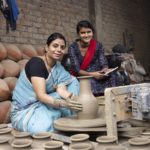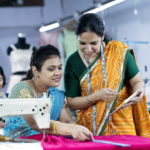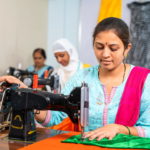Despite being the only region in the world where there are more female entrepreneurs than men, the vast majority of female-owned businesses in Sub-Saharan Africa are microenterprises and women’s businesses earn 34% lower profits than male-owned ones. Identifying the constraints faced by female entrepreneurs is vital for fostering economic growth. Recent studies have shown that…
Labour Markets
Digitising Historical Plant Level Panel Data on Labour Outcomes
This project seeks to digitise historical plant–level data on labour outcomes from India. In addition to monthly, plant–level data on various labour outcomes, these data contain unique plant identifiers, which can be combined with existing cross–section surveys of Indian manufacturing plants to obtain new panel data on Indian manufacturing plants for the 1980s and 1990s.…
Ticket to Thrive: Effect of Safe Public Transportation on Mobility and Employment of Women in Urban India
In India, only 20% of women participate in the labour force—less than in Bangladesh and Saudi Arabia—hampering national economic growth and women’s financial independence. This project investigates how safe public transportation, specifically the Delhi Metro, can alleviate mobility constraints that keep 60% of working women within 2km of their homes. We leverage past and future…
Education and Labour Market Dynamics in a Period of Rapid Education Expansion:
Recognizing the need for policies that address poverty and inequality and build social cohesion, the Ghanaian government rolled out free compulsory primary education in 1996 and free senior high school provision in 2017. With the first cohorts exposed to the free education policies now reaching prime adulthood, our project aims to take stock of how…
Market-Based Solutions to Gender Inequality in Job Search in Pakistan
Our research agenda addresses questions central to the economics of gender: To what extent are gender gaps in labour markets driven by labour demand versus supply? Given weak capacity in developing countries to enforce legislation, can market-based interventions help redirect the search of workers and firms towards more equitable matches? We leverage our research partnership…
From Jobs to Careers
Women’s participation in the labour market increases economic growth at both the national and firm level, yet women worldwide still face significant labour market challenges. Current research on women’s labour market experience in developing countries mainly focuses on short-term jobs. We propose shifting the focus from jobs to “careers,” i.e., occupations characterized by a long-term…
Women in Firms
Female labour force participation in developing countries like India is low and has been falling (Klasen and Pieters 2015; Fletcher et al. 2017). Safer workplaces may encourage more women to apply for work (Sudarshan and Bhattacharya 2009; Jayachandran 2020) especially in countries where stigma related to sexual harassment is high (Borker 2017, Sharma 2022). The…
Long–Run Social Norms and Female Labour Force Participation in India
India’s gender inequality and low female labour force participation rate (FLFP) are in stark contrast to its position as the fifth-largest economy in the world. Fewer than 25% of women work outside the home, and historical patriarchal norms are widely believed to be a factor. However, research on the impact of social norms on female…
Studying the Latent Demand for Female Labour in Rural India
In lower-middle-income countries, it is estimated that 35.5% of women over 15 participated in the labour force in 2018. Despite India’s rapid economic growth and increasing educational attainment, female labour force participation (FLFP) continues to lag behind, where the figure stands at a mere 29.4% (PLFS, July 2021-June 2022). There has been a burgeoning body…
Information Frictions and Gender Inequality in Online Labour Markets
Information asymmetry on the part of job seekers or applicants and employers may lead to skills mismatches that increase gender inequality in labour markets. Can online labour markets close gender gaps in employment by smoothing information frictions? And to what extent does providing more information to both applicants and firms lead to improved matching and…









